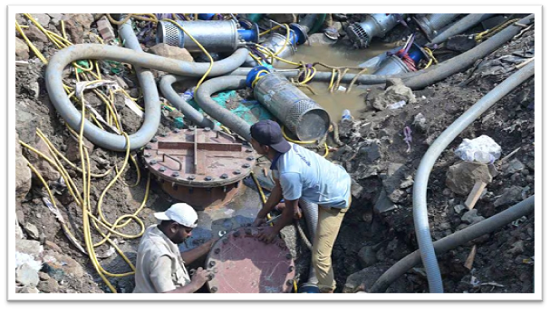
Mumbai Water Supply Shutdown: BMC Announces 22-Hour Disruption Across Ghatkopar, Kurla, Chembur, Wadala, Sion, and Matunga for Maintenance Work
Mumbai’s civic body, the Brihanmumbai Municipal Corporation (BMC), has announced a planned water supply shutdown across several major parts of the city as part of critical pipeline maintenance work. The operation, which involves replacing five large valves on the city’s main water pipelines, will lead to a complete water cut for nearly 22 hours, from 10 a.m. on November 14 to 8 a.m. on November 15.
This shutdown will affect residents in parts of Ghatkopar, Kurla, Chembur, Wadala, Sion, and Matunga. The civic administration has urged citizens in these areas to store sufficient water in advance and use it judiciously during the maintenance window.
The Maintenance Plan: 22 Hours of Major Pipeline Work
According to the BMC’s Hydraulic Engineering Department, the work involves replacing four butterfly valves and one sluice valve across the city’s main water trunks, the old and new Tansa mains and the Vihar trunk main, which are responsible for supplying water from the reservoirs to Mumbai’s eastern and central suburbs.
The civic body explained that the maintenance is part of an ongoing upgrade to improve water distribution efficiency and minimize leakage losses. The 22-hour operation is designed to enhance the reliability of the city’s aging pipeline network and ensure steady water pressure in the affected zones once work is complete.
Officials added that such large-scale valve replacement operations are technically complex and require complete shutdowns to prevent water backflow and ensure worker safety. Once completed, these changes are expected to improve the flow dynamics of the pipelines and reduce future disruptions caused by pressure imbalances or leaks.
Areas Affected: Localised Timings and Details
The BMC has released a detailed area-wise schedule of the shutdown to help residents prepare.
Ghatkopar (3:45 a.m. to 8 a.m. on November 15): Entire Rajawadi (East) including Chittaranjan Nagar, Vidyavihar area, Rajawadi Hospital, ONGC Colony, Railway Employees’ Colony, and R.N. Gandhi Marg will face a complete shutdown.
Kurla (10:00 a.m. on November 14 to 8:00 a.m. on November 15): New Tilak Nagar, Lokmanya Tilak Terminus, Sable Nagar, Santoshi Mata Nagar, Kranti Nagar, Nehru Nagar, Mother Dairy Road, Shivsrishti Road, Naik Nagar, Jagruti Nagar, Kedarnath Mandir Marg, S.G. Barve Marg (Kurla East), Navre Baug, Kamgar Nagar, Hanuman Nagar, Police Colony, Kasaiwada, Chunabhatti, Rahul Nagar, Everard Nagar, Qureshi Nagar, Takshashila Nagar, Chafe Galli, Pan Bazaar, Trimurti Marg, V.N. Purav Marg, Umarwadi Marg, Alidada Estate, Rajiv Gandhi Nagar, Swadeshi Jevan Chawl, Chunabhatti Phatak, Mhada Colony Prem Nagar, Hill Road, Muktadevi Marg, Tadwadi, and Samarth Nagar.
Chembur (November 14–15): Tilak Nagar, Tilak Nagar Station Road, Pestom Sagar Road Nos. 1 to 6, Thakkar Bappa Colony (Sectors 1–4), Shastri Nagar, Vatsalatai Naik Nagar, Sahakar Nagar, Shell Colony, Indira Nagar, S.G. Barve Marg, Eastern Express Highway (service road on the west side – Pragati Society), Godrej Colony, Yeshwant Nagar, Samrat Ashok Nagar, Raja Milind Nagar, Adarsh Nagar, Bhakti Park, Ajmera Colony, and MMRDA SRA Colony will experience a complete water cut.
Wadala, Sion, Matunga, and Dadar (3:45 a.m. to 8 a.m. on November 15): Sion (East and West), Dadar East, Matunga East, Wadala, parts of Chunabhatti, Pratiksha Nagar, Shastri Nagar, Almeida Compound, Panchsheel Nagar, Wadala Truck Terminal, Soda Buildings (New Cuffe Parade), Sion Koliwada–Sardar Nagar, Sanjay Nagar, Gandhi Nagar, K.D. Gaikwad Nagar, Korba Mithagar, Wadala, and Bhimwadi Gates Nos. 4 and 5 will be affected.
The Broader Picture: Infrastructure Renewal in an Aging Network
Mumbai’s water distribution network spans more than 4,500 kilometers, much of which was built during the mid-20th century. Frequent maintenance is essential to sustain pressure consistency and prevent losses. The BMC supplies nearly 3,900 million litres of water daily through seven major sources, including the Tansa, Vaitarna, and Bhatsa reservoirs, serving over 12 million residents.
Over the past few years, the civic administration has increased its focus on modernizing underground infrastructure to reduce leakages and improve service delivery. Officials estimate that non-revenue water losses (water that is produced but not billed) in Mumbai still hover around 20–25 percent, primarily due to old pipes and unauthorized connections.
By investing in periodic valve replacement and maintenance, the BMC aims to bring this figure closer to global urban efficiency benchmarks of under 10 percent. The upcoming maintenance, though temporarily inconvenient, forms part of this long-term modernization strategy.
Public Advisory and Citizen Preparedness
The BMC has urged all residents in the affected zones to store sufficient water for household needs before the shutdown begins. Water tankers will be available for emergency use in hospitals and essential service institutions, but individual housing societies have been asked to manage their own reserves.
Civic officials have also requested citizens to avoid unnecessary water usage before the maintenance begins to ensure equal supply to all localities. Once the maintenance is complete, residents may experience low pressure for a few hours as the system stabilizes.
The Hydraulic Engineering Department has assured that the work will be completed on schedule and that supply will resume gradually from 8 a.m. on November 15.
A Necessary Disruption for a Reliable Future
While a 22-hour water cut is a temporary inconvenience for residents, it represents essential groundwork for a city that depends on an intricate and aging water network. Preventive maintenance ensures system stability and prevents larger disruptions later, especially during the monsoon or peak summer months when demand rises.
Mumbai’s consistent maintenance schedule, though occasionally disruptive, remains one of the reasons the city continues to enjoy a relatively stable water supply compared to other major metros. The BMC’s approach, combining technical upgrades with public communication, reflects a governance model that values transparency and long-term reliability.
For citizens, the short-term inconvenience may be the price for a more resilient urban water system, one that ensures every drop continues to reach the taps of one of the world’s most densely populated cities.





